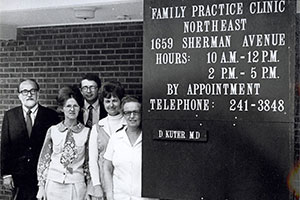
Wingra Clinic was the first to open its doors in 1971 soon followed by the Verona Clinic in 1972 and the Northeast Clinic (pictured) in 1973.
At the University of Wisconsin School of Medicine and Public Health (SMPH), 2020 marks the 50th anniversary of its Department of Family Medicine and Community Health (DFMCH) serving the people of Wisconsin. This milestone is not being celebrated as originally planned—with keynote speakers, picnics and hugs from old friends—but it is being marked by reflections on a year that highlighted the pillars on which the department was built: vision, leadership and service. Those pillars helped found the department in 1970, and five decades later, they have helped the DFMCH navigate the unprecedented COVID-19 pandemic.
William Schwab, MD, could not foresee the challenges ahead when he accepted the role of interim and eighth chair for the DFMCH in January 2020, but he notes that the faculty and staff’s ability to rise to challenges has helped the department grow. “I’m honored to serve as interim chair of a department with such a rich history and legacy of strong leaders,” says Schwab. “And I am deeply grateful for the amazing contributions and dedication of the innovative faculty, staff and learners who have been the foundation of our department’s commitment over the past half-century to educate our future family physicians, engage in meaningful scholarship, serve our communities, and enhance access to world-class health care for the people of Wisconsin.”
A Little History
It seems fitting that what we now know as the UW Department of Family Medicine and Community Health started where life begins, with babies. DFMCH founder Marc Hansen, MD, restored the languishing Department of Pediatrics’ Well-Baby Program in 1965, as a team practice featuring physicians from different specialties, nurses, social workers and therapists. The idea was to assemble comprehensive care teams to work together to support the whole health of babies and families. This program morphed into the department’s first primary care teaching program, the University Family Health Service, which served as a model that would guide the DFMCH for years to come. “My practice partner, Dr. Ken Reeb, and I created a curriculum for describing, understanding and developing primary care,” recalls Hansen. “We also began to place third and fourth-year medical students on their pediatric rotation into community practices. The family physicians and the emerging American Academy of Family Physicians (AAFP) became our best and most active supporters.”
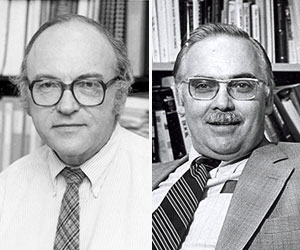
Marc Hansen, MD, (left) hired John Renner, MD, (right) to lead the Madison Family Practice Residency Program in 1970.
This effort soon caught the attention of Tommy Thompson, who was then a state assembly member, later became the governor of Wisconsin and is now serving as the interim president of the UW System. Thompson wanted to make sure the medical school was doing enough to train doctors to serve small Wisconsin communities like his hometown of Elroy. A bill was soon passed that provided $50,000 to expand primary care teaching programs and initiate family medicine training. St. Mary’s Hospital, under the leadership of Sister Rebecca Wright, provided additional funding and physical space for the program to thrive and become one of the first 15 programs approved for family medicine residency training in the United States.
When David Kuter, MD, visited the UW-Madison campus in June 1971, to interview for a spot in the new Madison Family Practice Residency Program, he recalls helping John Renner, MD—the recently hired program leader who became the department’s first chair—unpack books in his office. Though the program was new, Kuter was impressed with Renner. “I was attracted to his vision for the program and by the commitment of St. Mary’s Hospital to support the program through its cadre of practicing physicians. My wife, Judy, and I thought we would enjoy living in Madison for the residency and somewhere in Wisconsin thereafter,” shares Kuter, who went on to practice in Wisconsin, as have roughly 65 percent of graduates since the residency program’s inception.
DFMCH Today

John Frey, MD, chair from 1993-2006, helped expand opportunities for residents interested in rural health.
Buoyed by inaugural chair Renner’s entrepreneurial spirit and imagination, each subsequent chair has spurred growth and weathered challenges. Those chairs have been William Scheckler, MD, 1978 to 1982; Eugene Farley, MD, MPH, 1982 to 1992; Richard Roberts, MD, JD, interim 1992; John Frey, MD, 1993 to 2006; James Davis, MD, MS, interim 2006 to 2008; Valerie Gilchrist, MD, 2008 to 2020; and Schwab, the current interim chair. Today, the DFMCH is one of the largest family medicine departments in the country and is dedicated to service through education, patient care, community health, research and diversity initiatives.
Education
In 2019, the DFMCH educated more than 500 medical students. Its Office of Medical Student Education teaches medical students during all four years of their education through coursework, community outreach programs and hands-on mentoring. Under the leadership of David Deci, MD, who recently retired from his position as director of medical student education, the office’s Family Medicine Interest Group (FMIG) has earned seven Program of Excellence Awards from the AAFP for outstanding activities that generate interest in family medicine. “Our Family Medicine Interest Group is a powerful force for getting medical students interested in family medicine,” Deci said in 2015, after receiving the second award.
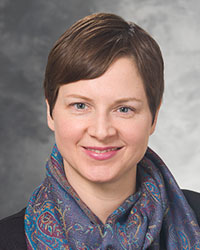
Ildi Martonffy, MD, residency program director, is proud to be part of a legacy of strong family physicians.
Residency education also has flourished. A program that started with just two residents in 1971 trained more than 100 residents in 2020 through programs sponsored by the DFMCH and its academic partners. Residency Program Director A. Ildi Martonffy, MD, says she is excited to be associated with a program that has such a strong legacy. “I’m honored to be part of a program that continues to grow and adjust its curriculum to meet the training needs of our residents and the primary care needs of the State of Wisconsin,” exclaims Martonffy.
Similarly, Frey reflects on the pride he feels about serving as chair of the DFMCH during a time when the program expanded its opportunities for residents to focus on medically underserved populations through rural, urban and global health initiatives. “When I took the role of chair in 1993, it was already a strong department with a statewide training network,” he recalls. “We were able to establish three rural training tracks thanks to the strong pool of talent and dedication in communities throughout the state.”
The most recent offering, launched in 2018, is the Rural Health Equity Track, which focuses on rural health issues and connections within rural Wisconsin communities for doctors interested in pursuing a career in rural medicine. For those interested in helping in urban areas, the SMPH’s Training in Urban Medicine and Public Health program partners with more than 40 hospitals and community organizations in the Milwaukee area to provide internships and hands-on experiences for students to gain the skills they will need to serve as physicians in medically underserved areas. In addition, the DFMCH’s Global Health Pathway provides residents with opportunities to learn and serve at international sites while promoting the skills and knowledge to become leaders in the health of populations locally and beyond.
DFMCH Through the Years Slideshow
Patient Care, Community Health, and Diversity, Equity and Inclusion
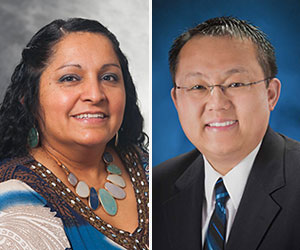
Patricia Téllez-Girón, MD, (left) and Kevin Thao, MD, MPH, (right) partner with the DFMCH Office of Community Health to enhance education, research and patient care in the communities they serve.
The first DFMCH clinic—Wingra Family Medical Center—opened its doors in 1971. Forty-nine years later, the department provides care for patients in 17 clinics throughout Madison and surrounding communities. Patient visits to these clinics neared 350,000 in 2019, and offerings have grown to include special services such as geriatrics, substance abuse, mental health, sports medicine, gender services, osteopathic manipulation and integrative medicine, in addition to primary care. Over the years, the DFMCH has embraced an increasingly diverse patient population and recognized a need to create programs to address health disparities and community challenges.
In 2015, the department officially added “Community Health” to its name to reflect its longtime dedication to promoting and enhancing such efforts in education, research and patient care. The department’s Office of Community Health supports conditions that provide all people with equal opportunities to be healthy and thrive. For example, Patricia Téllez-Girón, MD, was recently honored by Time magazine for her efforts in the Latinx community in Dane County during the pandemic. For the past 17 years, she has been a host of the Spanish-language radio station La Movida to answer questions and provide guidance about best practices for maintaining health and safety in a community already at risk for health disparities. She also has co-chaired the Latino Health Council of Dane County for the past 20 years. Kevin Thao, MD, MPH, partners with local organizations in Wausau to improve Hmong health. The Hmong Community Health Needs Assessment Survey aims to determine the prevalence of diseases such as hypertension, diabetes and heart disease in Hmong people and identify the extent of and reasons for disease disparities between the Hmong population and the general population.
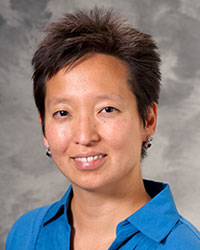
Jennifer Edgoose, MD, MPH, director of the Office of Community Health and chair of the Diversity, Equity and Inclusion Committee, believes DFMCH is committed to addressing the challenges of equity and racism in the health care community.
In 2015, the department established the Diversity, Equity and Inclusion Committee to promote these principles and to advise department leaders on processes related to recruitment and retention of diverse learners, faculty and staff. Jennifer Edgoose, MD, MPH, directs the Office of Community Health and chairs the DFMCH Diversity, Equity and Inclusion Committee. “The global pandemic and social and racial justice movements of 2020 have shown us that we have much work to do to resolve disparities and racism in health care,” notes Edgoose. “The DFMCH is committed to addressing these challenges. With the commitment of many members across our department and the support of our leadership, not only in words but in action, we hope to invoke sustained change at both the individual and institutional levels in practice and policy, as we strive to become an anti-racist department.”
Research

Randy Brown, MD, PhD, FASAM, is a nationally recognized researcher and advocate in addiction medicine.
Under the guidance of Farley, the chair at the time, the department established a research division in 1984. That team has grown to 11 faculty members and staff scientists who are primarily devoted to improving the health and health care experiences for individuals, families and communities in Wisconsin and beyond. In 2019, the division garnered $8.8 million in grant awards to fund important research in the areas of addiction; substance-misuse prevention and treatment; infectious disease surveillance; and systems-engineering approaches for improving ambulatory care. The research and national advocacy work of Randall Brown, MD, PhD, helped get addiction medicine recognized as a medical subspecialty and paved the way for the DFMCH Addiction Medicine Fellowship to become accredited. The fellowship, run in collaboration with the William S. Middleton Memorial Veterans Hospital, provides clinical experiences and instruction in the management of substance-use disorders. “Funding for research in family medicine is invaluable,” notes Brown. “Without it, we could not develop programs like this one to help us improve the lives of individuals, families and communities struggling with addiction and related issues.”
A Reason to Celebrate
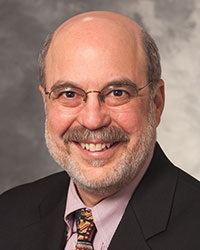
William Schwab, MD, interim and 8th chair for the UW DFMCH is grateful for the contributions of innovative faculty, staff and learners who are the foundation of the department.
Throughout the years of growth and change, the DFMCH has consistently ranked among the top 10 family medicine programs in the United States. To date, 1,482 physicians have graduated from its residency program, and more than two-thirds of these graduates have gone on to practice in Wisconsin. As many seek to hasten the end of the tumultuous 2020, the more than 1,000 faculty and staff members who call DFMCH home continue to work together for the welfare of the people of Wisconsin and for a future filled with promise and opportunity. “I’ve watched the people in our department work together in the face of tremendous challenges over the past year,” reflects Schwab. “This has renewed my confidence that the future is bright for the DFMCH. I look forward to future celebrations!”
Originally published for the UW SMPH Quarterly (PDF)
Published: October 2020
